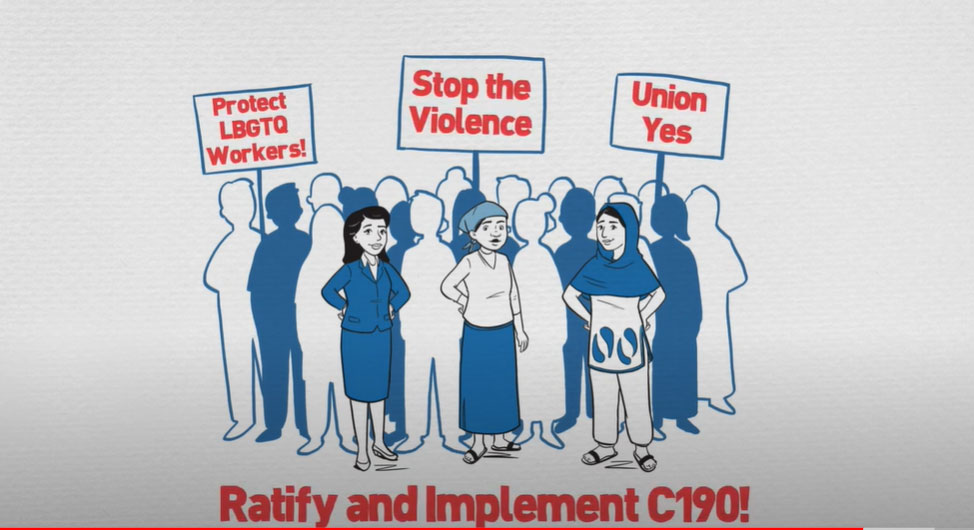Labor leaders, policymakers and stakeholders from around the world discussed efforts to prevent gender-based violence and harassment at the workplace at a panel discussion, “Ending Violence and Harassment in the World of Work” on Thursday, April 7. The panel was part of the Organization for Economic Cooperation and Development’s Global Deal conference, “A Better Future for Essential Workers.”
Listen to this article.
Sabina Dewan, president and executive director of the JustJobs Network moderated the panel. Speakers included: Philippe Symons, Sodexo chief ethics officer; Claudio Moroni, Argentina Minister of labor, employment and social security; Sandra Hassan, Canada deputy minister of labor; Shawna Bader-Blau, Solidarity Center executive director; Frances Onokpe, Federation of Informal Workers Organization of Nigeria program officer; and Joaquin Pérez Rey, Spain’s vice minister for employment and social security.
Moroni began the discussion by describing Argentina’s efforts to address workplace violence and harassment. “Argentina has a long history of confronting violence and harassment in the workplace,” Moroni said. “The labor ministry believes there’s no such thing as an effective standard unless it includes behavioral results.”
To that end, Moroni said the ministry is working with female union leaders to include language in collective bargaining agreements to counter violence and develop a law to regulate the implementation of International Labor Organization Convention 190 (C190) in Argentina. Moroni closed his remarks by re-emphasizing the importance of concrete results. “Laws are not effective unless they are translated into concrete action. We are working to make sure these efforts are translated into specific conduct.”
Hassan said that Canada is in the process of C190, “One of our priorities is to continue making sure workplaces are safe and inclusive for everyone,” she said. “The ratification of C190 is a top priority of the government of Canada.” A year ago, Canada brought forth groundbreaking legislation to prevent violence and harassment in federal workplaces. “We also developed a fund that supports partner organization projects that develop sector-specific tools and practices to prevent violence and harassment in the workplace,” Hassan said.
Bader-Blau described the Solidarity Center’s partnership with Lesotho-based trade unions and women’s rights groups, global fashion brands and international rights organizations to secure a safe and dignified workplace for women employed in the country’s predominantly female garment sector. The partnership resulted in a precedent-setting program to comprehensively address rampant gender-based violence and harassment in garment factories. The program was established by two negotiated and enforceable agreements to mandate education and awareness trainings for all employees and managers, an independent reporting and monitoring system, and remedies for abusive behavior.
“These agreements were signed among apparel brands to combat violence and harassment in Lesotho’s garment sector,” Bader-Blau said. “The agreements link businesses to a commitment to eliminate gender-based violence and harassment.
“The program is also focused on culture change,” Bader-Blau said. “Thousands of workers have participated in two-day training sessions about gender-based violence and harassment.” As part of the program, Workers Rights Watch “trains intake counselors who listen with empathy and are empowered to take action.” As a result, “workers are starting to believe that employers are committed to ending gender-based violence and harassment. “The lesson we learned is that worker-led solutions matter.”
Bader-Blau also described what’s needed to replicate the success in Lesotho. “We need to move from good global framework agreements to negotiated solutions that hold suppliers and buyers accountable, not voluntary codes of conduct. We need to hear from global brands if that’s what they want to do. We need to invest in systems that recognize that abuse is common, and we need to invest in systems that establish third-party interventions.”
The Global Deal is a multi-stakeholder initiative for social dialogue and inclusive growth–a partnership of governments, businesses and employers’ organizations, trade unions, civil society and other organizations. The aim of the Global Deal partnership is to benefit from and contribute to, a platform that highlights the value of social dialogue and strengthens existing cooperation structures.

